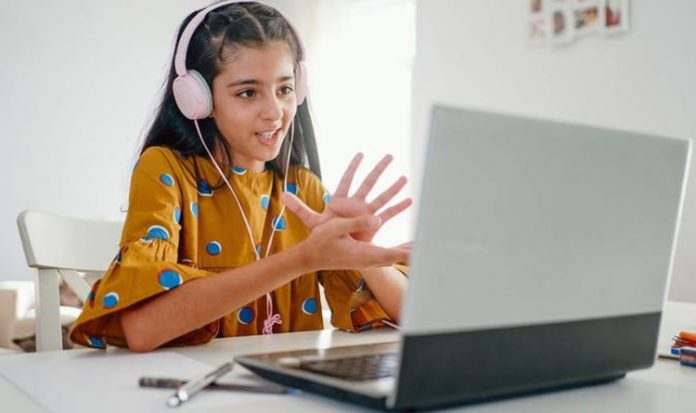Schools were closed to the majority of students in England after Prime Minister Boris Johnson announced the third national coronavirus lockdown. As a result, all students apart from vulnerable children and children of essential workers must learn remotely until at least mid-February. But for those without the necessary equipment, how can you apply for a free school laptop, tablet or iPad?
Prime Minister Boris Johnson announced a national lockdown instructing people to stay at home in a bid to control the virus, protect the NHS and save lives on January 4.
This mandate, which was ratified into UK law on Wednesday, saw pupils in primary schools, secondary schools and colleges move to remote learning.
Only children of key workers and vulnerable children can continue attending school in person.
The Prime Minister admitted, “this will mean it is not possible or fair for all exams to go ahead this summer as normal”.
READ MORE: Can I go back to university in lockdown?
Announcing the lockdown, Mr Johnson said: “I want to say to everyone right across the United Kingdom that I know how tough this is, I know how frustrated you are, I know that you have had more than enough of Government guidance about defeating this virus. But now more than ever, we must pull together.”
The PM added: “The weeks ahead will be the hardest yet but I really do believe that we are entering the last phase of the struggle.
“Because with every jab that goes into our arms, we are tilting the odds against Covid and in favour of the British people.
“And, thanks to the miracle of science, not only is the end in sight and we know exactly how we will get there.
“But for now, I am afraid, you must once again stay at home, protect the NHS and save lives.”
However, for those unable to get a device in time, Mr Williamson confirmed pupils unable to access classes online due to not having the right equipment, broadband access or space are entitled to attend school as usual.
An estimated 1.78 million children (around nine percent of all children) do not have home access to the internet and therefore cannot adopt remote learning measures.
More than 880,000 of them live in a household with only a mobile internet connection.
Schools remain open throughout the lockdown for vulnerable children and children of key workers.
Vulnerable children and young people include those who:
- Are assessed as being in need under section 17 of the Children Act 1989, including children and young people who have a child in need plan, a child protection plan or who are a looked-after child
- Have an education, health and care (EHC) plan.
have been identified as otherwise vulnerable by educational providers or local authorities (including children’s social care services), and who could therefore benefit from continued full-time attendance, this might include:
- Children and young people on the edge of receiving support from children’s social care services or in the process of being referred to children’s services
- Adopted children or children on a special guardianship order
- Those at risk of becoming NEET (‘not in employment, education or training’)
- Those living in temporary accommodation
- Those who are young carers
- Those who may have difficulty engaging with remote education at home (for example due to a lack of devices or quiet space to study)
- Care leavers
- Others at the provider and local authority’s discretion including pupils and students who need to attend to receive support or manage risks to their mental health
READ MORE: Coronavirus POLL: Do you agree with the return to a full lockdown?
Mr Williamson’s announcement means more than one million pupils will be able to continue with their education. However, the move has prompted concerns some concern schools could be inundated with students during lockdown.
The National Association of Head Teachers (NAHT) said the move could reduce the effect of the shutdown.
The NAHT general secretary Paul Whiteman said demand for key worker and vulnerable places in schools had risen substantially since the last school shutdown.
He said: “It is critical that key worker child school places are only used when absolutely necessary to truly reduce numbers and spread of the virus.
“We have concerns that the government has not supplied enough laptops for all the children without them and so has made lack of internet access a vulnerable criteria – only adding to numbers still in school.
“It is important that all vulnerable pupils have access to a school place, but the government must provide laptops and internet access for every pupil that needs one so that they can access home learning to take some of the strain off the demand for school places.
“Nearly half of headteachers whom we polled during a webcast on Wednesday evening said that had received fewer than 10 percent of the laptops they’d requested.
“It is essential that this is rectified immediately so that we can keep school attendance figures at a level which will have the desired impact on getting transmission rates under control.”







